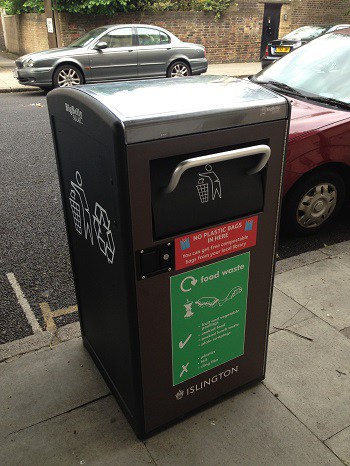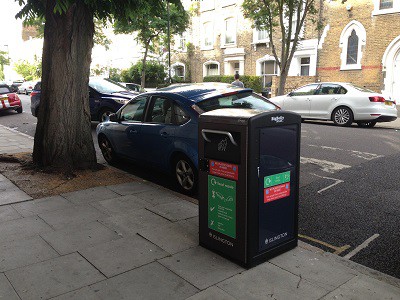The North London authority, which received money from WRAP for its work on food waste, outlined the decision last month in a Waste Minimisation and Recycling Action Plan 2015/16.

The move represents the latest attempt by a local authority to slash costs in the face of swingeing budget cuts and, in addition to changes to garden waste collections, is hoped to save the council £500,000 in 2015/16. Food and garden waste are currently treated at LondonWaste’s Edmonton EcoPark.
From this week (June 15), a three month trial of the new service started for 2,000 properties in Islington’s Tollington Ward. Communal food waste facilities have been placed “within reasonable walking distance” of homes and residents are encouraged to compost their food waste at home or take it to these locations. Meanwhile, garden waste will be collected from communal collection points in parks or collected from households for a fee.
Islington’s waste strategy manager Matthew Homer said in the report: “Changing the way that garden and food waste collections are made in future will enable the dry recycling and rubbish collections to be made using one vehicle instead of two separate vehicles, significantly reducing the cost of collections, the number of vehicles needed and the number of journeys made.”
Recycling rate
At present, residents in street properties in Islington have their food waste collected from their property weekly, with around 30% of the households offered the service using it. The service collects around 1,500 tonnes a year, contributing around 2.4 percentage points to Islington’s overall recycling rate which stood at 32.7% in 2013/14.
Meanwhile, street properties also receive free weekly garden waste collections, with around 1,300 tonnes collected each year, contributing around two percentage points to Islington’s recycling rate.
Under the new arrangements, residents will be provided with communal food waste facilities that “will embrace new technology and consist of modern, robust, rodent proof metal containers within reasonable walking distance.” They will be situated at locations such as street corners and suitable pavements where recycling sites already exist. These facilities will be emptied weekly or more often if required. Residents on estates would also no longer receive doorstep collections.
However, whether residents use the service in practice remains to be seen, particularly given the heavy nature of food waste and difficulty in carrying it.
The communal bins being used for the trial are BigBelly bins, which use solar power to compact the food waste and reduce the need for collection. The bins are already used for other materials by councils including Nottingham and Bath & North East Somerset.
For garden waste meanwhile, similar communal facilities will be set up at local parks and residents could also take material for free to their local recycling centre. Alternatively there would be an online bookable service subject to a proposed minimum charge of £10 for up to 10 sacks.
Dry recycling and refuse will continue to be collected in Islington weekly.

Like other local authorities, Islington council is working towards a target to recycle 50% of waste by 2020 as part of the North London Waste Authority and is hoping to recycle and compost 34.5% of its waste in 2015/16.
Constraints
Although the council acknowledged that the move towards communal organic waste collections was likely to impact on its recycling rate, it claims the cuts are necessary in light of financial constraints and that any affects will be mitigated by a targeted communications campaign to encourage people to recycle and by the provision of subsidised home compost bins.
Mr Homer said in the report: “…recycling more needs to be set in the context of financial responsibility rather than a single overriding sole objective. It is right to recycle as much as possible but here may be situations where the cost of doing so makes it unrealistic.”
In 2010, Islington received a grant from WRAP to expand its food waste recycling service for estates. At the time, the council already provided kerbside collections to nearly all residents in the borough and Islington’s then executive member for environment, councillor Greg Foxsmith, said: “Recycling food waste helps the environment and also cuts landfill costs, which is good news for all council taxpayers. This is another sign of our commitment to being the greenest borough in London.”
The changes to food and garden waste collections were outlined by Islington along other plans to cut costs, including reducing its funding for the Bright Sparks reuse initiative and introducing a ‘village principal’ into the organisation of street environmental services by creating area-based waste and recycling collection teams, which would see services planned around six ‘villages’ in the borough.










Not surprising. Look up cost of collecting food waste particularly at locations such as Islington and check collection efficiencies and carbon footprint of the total effort. Unless there is an AD facility with assured supply, if councils use in-vessel composting after collecting the stuff at huge cost, only mad hatters will invest in food waste collection.
With tight budgets and scarcity for money for more worthwhile services, meeting recycling targets is not a priority – The council will not only save money but will also reduce the overall carbon footprint of collection and treatment. Hope more councils follow Islington’s example.
Really interested to see how this goes – particularly in terms of capture rate and % contamination. I wonder whether it could signal a move towards a continental model in our cities, with provision of multiple ‘bring’ banks for all materials – instead of doorstep collections.